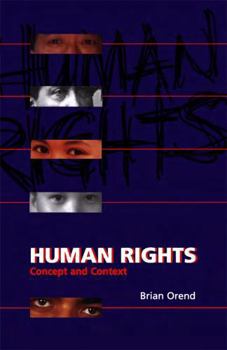Human Rights: Concept and Context
Winner: 2002 Choice Outstanding Academic Title Award What are human rights? What justifies us in believing we have them? What are rights-holders and duty-bearers? Who should bear the costs and... This description may be from another edition of this product.
Format:Paperback
Language:English
ISBN:1551114364
ISBN13:9781551114361
Release Date:May 2002
Publisher:Broadview Press Inc
Length:272 Pages
Weight:0.50 lbs.
Customer Reviews
1 rating
Good introduction to the philosophical side of human rights
Published by Thriftbooks.com User , 15 years ago
I teach a college philosophy course on human rights and use this text. In my opinion, it is the best such text available. The reason for this is two-fold: it is written with the student in mind (and hence, it is written to be accessible) and it goes into more philosophical depth than most human rights books do as to the foundations of human rights. In particular, I like the fact that it defends its own theory of foundations, rather than merely summarizing others' views. Moreover, the theory it defends (which roots human rights in vital human needs) is both interesting and plausible. I particularly like the discussion in Chapter 5 of the proper division of labor (as regards the promotion of human rights) between individuals and institutions. I agree with the previous reviewer that Orend's occasionally colloquial language can be offputting and annoying. However, this is a minor flaw. A more serious shortcoming in my opinion is the odd decision to discuss the question (in Chapter 2) of who has human rights (i.e. what sorts of beings have human rights) before discussing the question (in Chapter 3) of the foundations of rights. In saying who has human rights, one must say why exactly that group of beings has those rights, and this involves explaining the basis of rights. This creates some repetition between Chapters 2 and 3. I would rather the author have gone straight to the foundational question in Chapter 2; then the answer to the question of who has rights would have emerged naturally as a corollary of these foundations, with no need for a separate chapter. I also wish the text had taken the animal rights challenge more seriously than it does (namely, the criticism that doctrines of rights are arbitrarily narrow insofar as they are restricted to humans alone). But one cannot do everything in a short book, so I suppose the decision not to discuss this challenge in detail was a reasonable one. In short, this is a very worthwhile book which, despite some shortcomings, has a lot to offer the student of human rights.






